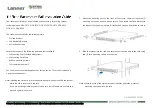
38
Specification Update
AAU69.
Storage of PEBS Record Delayed Following Execution of MOV SS or STI
Problem:
When a performance monitoring counter is configured for PEBS (Precise Event Based
Sampling), overflow of the counter results in storage of a PEBS record in the PEBS
buffer. The information in the PEBS record represents the state of the next instruction
to be executed following the counter overflow. Due to this erratum, if the counter
overflow occurs after execution of either MOV SS or STI, storage of the PEBS record is
delayed by one instruction.
Implication:
When this erratum occurs, software may observe storage of the PEBS record being
delayed by one instruction following execution of MOV SS or STI. The state information
in the PEBS record will also reflect the one instruction delay.
Workaround:
None identified.
Status:
For the steppings affected, see the Summary Tables of Changes.
AAU70.
Performance Monitoring Event FP_MMX_TRANS_TO_MMX May Not
Count Some Transitions
Problem:
Performance Monitor Event FP_MMX_TRANS_TO_MMX (Event CCH, Umask 01H) counts
transitions from x87 Floating Point (FP) to MMX™ instructions. Due to this erratum, if
only a small number of MMX instructions (including EMMS) are executed immediately
after the last FP instruction, a FP to MMX transition may not be counted.
Implication:
The count value for Performance Monitoring Event FP_MMX_TRANS_TO_MMX may be
lower than expected. The degree of undercounting is dependent on the occurrences of
the erratum condition while the counter is active. Intel has not observed this erratum
with any commercially-available software.
Workaround:
None identified.
Status:
For the steppings affected, see the Summary Tables of Changes.
AAU71.
INVLPG Following INVEPT or INVVPID May Fail to Flush All
Translations for a Large Page
Problem:
This erratum applies if the address of the memory operand of an INVEPT or INVVPID
instruction resides on a page larger than 4KBytes and either (1) that page includes the
low 1 MBytes of physical memory; or (2) the physical address of the memory operand
matches an MTRR that covers less than 4 MBytes. A subsequent execution of INVLPG
that targets the large page and that occurs before the next VM-entry instruction may
fail to flush all TLB entries for the page. Such entries may persist in the TLB until the
next VM-entry instruction.
Implication:
Accesses to the large page between INVLPG and the next VM-entry instruction may
incorrectly use translations that are inconsistent with the in-memory page tables.
Workaround:
It is possible for the BIOS to contain a workaround for this erratum.
Status:
For the steppings affected, see the Summary Tables of Changes.













































